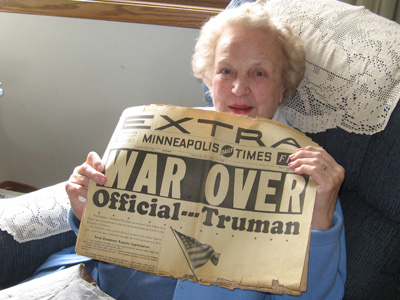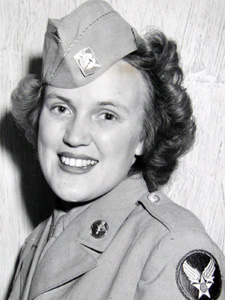
Mary Baruth, 85, of Bloomington was one of the first people to know that the Japanese had bombed Pearl Harbor to start World War II. “I was a telephone operator in the Kenwood District — the only one left that was manual. We were all half-asleep when the board lit up,” she told me on Thursday. “I knew our life was going to change from then on.” (Listen)
She didn’t know then, of course, that she’d spend the war years in the Army Air Force. She hadn’t considered the military until a trip to Seattle where she met women in the Coast Guard who convinced her that the reputation of military women as “raunchy” wasn’t true. “It was new to have women actually in the service and there were rumors that there were a lot of rough women in the service. And there were a few.” Two of her best friends in the service became nuns after the war. “I made two of my best friends nuns,” she said. (Listen)
 She joined the Army after a fight with her boyfriend, she said. She served in the Army Airways Communication System, investigating people who were going to be engaged in secret work. “Any guy who was going to do any of the secret work had to be investigated, and we would try to get information on him from the various police departments.” She started in Shepherd Field in Texas but was eventually moved to Langley, Virginia, now the home of the CIA. “That was interesting because of all the secretive work that was going on there.”
She joined the Army after a fight with her boyfriend, she said. She served in the Army Airways Communication System, investigating people who were going to be engaged in secret work. “Any guy who was going to do any of the secret work had to be investigated, and we would try to get information on him from the various police departments.” She started in Shepherd Field in Texas but was eventually moved to Langley, Virginia, now the home of the CIA. “That was interesting because of all the secretive work that was going on there.”
“Any secrets you’d like to share,” I asked.
“No,” she said with a laugh, leaving the distinct impression it wasn’t because she didn’t know them. “They had us in a building with no windows. It was like working in a dungeon.”
Mary Baruth (then Mary Reese) met the man who would become her husband after the war, when he walked into her office by mistake. It wasn’t until 1949 that they married and had three children — he called them “Little works of Art.” He died last year.
The military was one of the best times of her life. “When I went in the service, I had to do things whether I liked to or not. Just to get out and meet people, it just changed my whole life as far as me not being in a shell anymore,” she said. “I always think it gave me more confidence — the people I met and travel. But I wasn’t just going in for me. I was trying to help out.”
Asked about an event next week at which Minnesota’s women veterans will be honored, Baruth said, “It’s kind of late, isn’t it? We were new to the service, but it’s taken awhile and I’m thinking, ‘how many of us are left?'”
What would she like to hear someone say? “That we’ve done well. That we helped out,” she said, with a touch of guilt, however. “We were there to relieve the guys and if we weren’t there, maybe some of them wouldn’t have had to go overseas.”
This is the final of the short series on the women of World War II. You can find the first one here and the second one here. My colleague, Elizabeth Stawicki, also produced a nifty story on the subject in 2005.
